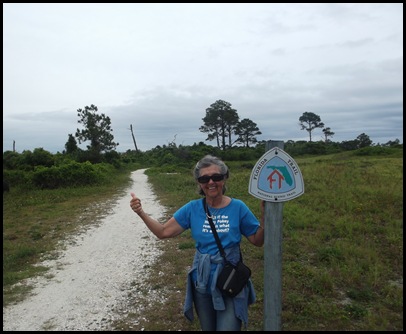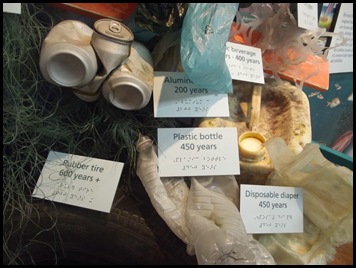Saturday May 11, 2013
Site 33, Fort Pickens Campground
Gulf Islands National Seashore, Florida
Today I want to take a closer look at the small section of the Florida Trail within the park.
Part of it follows the park road. This morning I run the part that doesn’t. I start at the campground, in about the middle of the off road trail section and run down to the beginning of the Florida Trail at the Fort. I turn around there and ran back all the way past the campgrounds and on until the trail goes over and joins the road. Then I start back to the campground. It is just a little less than 5 miles total.
I get a little wet; my clothes get a lot wet.
It is a lovely trail under threatening skies and the rain finally materializes when I am on my way back to the campground. So I get soaked but it isn’t cold. Wet clothes but no harm done. But I do hope it will quit raining so I can walk the trail and actually look at it rather than just keep my eyes on the ground so I don’t trip.
The rain stops by early afternoon so we walk over to the Fort on the Florida Trail.
The pictures in this first section of this post are all taken from that walk.
When we cross the bridge near the fort, we look down and see 3 and then 4 and then 5 turtles. The water is dark but when they come up near the surface, I manage to get hazy pictures of the interesting designs on their backs. I suspect that like zebras, no two are alike. We walk back and forth from one side of the bridge to the other watching them swim.
We arrive at the head of the Florida Trail and I have the “I was here” shot taken even though I am not starting out on a walk of 1100 miles. Instead, we walk less than 1/4 mile over to the museum.
The museum is housed in the old barracks building from the early 20th century.
There are also several houses next to the museum. All of them are in excellent shape and currently being used. This period of building is among my favorites. Don’t they all look like someone’s grandmother’s house with a big front porch which needs a swing?
Inside we find an excellent interactive museum with lots of information about the flora and fauna of the National Seashore as well as its history.
The history includes the very sad chapter about Geronimo and the others in his small Chiricahua Apache band.
This story of their time at Fort Pickens is so lamentable that I want to share it with you.
After the Civil War, the U.S. government turned its military might against the Native Peoples of the west. Tribes were forced to give up most of their traditional lands and ways of life for reservations. After 1875, the reservations were steadily made smaller as miners and settlers moved into the territory and demanded the land. The Apaches faced loss of their land as well as their freedom. They distrusted the American government due to so many previously broken promises. As conditions on the reservation worsened, some bands escaped including one led by Geronimo.
His band successfully evaded 5,000 U.S. soldiers (about 1/4 of the U.S. Army at that time) and 3000 Mexican Soldiers. Finally Geronimo’s group agreed to meet in Skeleton Canyon, Arizona territory where they negotiated with General Miles on September 3, 1886. Four days later, the entire Chiricahua tribe were put on trains and exiled to Florida where they were held as prisoners.
All of the Apaches were intended to be held captive at Fort Marion but hoping to capitalize on Geronimo’s fame, several prominent Pensacola citizens petitioned the government to have Geronimo’s group sent to Fort Pickens. The editor of The Pensacolian newspaper noted that Geronimo would be “an attraction which will bring here a great many visitors.” President Cleveland approved the petition for the Apache men only, separating them from their families and breaking another promise.
They were housed in two casemates (rooms for cannon)and worked 7 hour days clearing overgrown weeds, planting grass, and stacking cannonballs. They were model prisoners who did not get into trouble or try to escape. Ultimately they were reunited with their families a year later although without their freedom and in an unfamiliar land. The fear of yellow fever led the Army to remove them from Fort Pickens in 1888 and send them to Mount Vernon Barracks, north of Mobile, Alabama. They were moved a final time to a reservation at Fort Sill, Oklahoma in 1894. Geronimo died there in 1909 never having regained his freedom or his homeland.
This quote from Geronimo was on the wall.
On a lighter note, there are photos of the beaches around the time the houses were built.
Pictures of folks having a good time in the water in suits like this one. What a riot! Better not get into a rip current in this or the weight of it alone will pull you under.
Another interesting exhibit is coincidentally one on litter showing how long it takes common trash to decompose in a landfill.
I guess I knew these numbers at one time but they were shocking today. Wish they would have listed drinking straws. I looked it up 100-200 years for plastic straws.
| Plastic Grocery Bag | 10-20 years |
| Cigarette Butts | 5-10 years |
| Plastic Beverage Holders | 400 years (those 6 pack rings) |
| Plastic bottles | 450 years |
| Disposable Diapers | 450 years |
| Wax milk carton | 3 months |
| Cloth diaper | 1 year |
| Cardboard Box | 2 months |
| Styrofoam Rubber Tire | 50 years 600 years |
| microfilament nets (fishing) Aluminum Cans | 500-600 years 200 years |
I am getting older but not any wiser obviously.
At 2:00 David leaves to take the fort tour. I pass on this one and spend some more time in the museum before taking the Florida trail back to the campsite where………………….I am again locked out. Too funny. He has the key again. When WILL I learn to bring my key? Luckily it isn’t raining. Also luckily I have a book to read so after about an hour, David shows back up. No harm, no foul. I know, I know, I need a “hidden” key but that means I have to go shopping to get one. You can see the dilemma I’m sure.
After dinner, I go with my fingers crossed hoping for a last visible sunset on the Gulf at Fort Pickens.
David is working on materials for his medical visits in Virginia and Massachusetts over the summer so he doesn’t come. Actually I bet he doesn’t think I’m going to see anything.
The weather has been on the verge of storm all day so I’m not surprised to see the clouds trying to press out the sun.
But the sun makes a break for it.
And a close up zoom shows it red hot and in charge as it slips behind the dunes and out of sight.
We leave early tomorrow to get a site on the other end of the Gulf Island National Seashore in Mississippi at Davis Bayou Campground,
We Hope!
















Those decomposting figures are alarming to say the least!!! Those newfangled disposable Diapers are BAD!!!
ReplyDeleteLove the brooding sunset picture (1st one)
Lovely as usual. We rode our bikes on that trail to the fort. Nice memories :)
ReplyDeleteThanks for sharing the story of Geronimo. It is sad to think about what we took away from the Native Americans but important to remember. Glad your last day at Fort Pickens turned out so beautiful.
ReplyDeleteThere is some great history there:) Have a safe trip:)
ReplyDeleteSo you did get to finish up this location with a bit of sunset. The museum sounds very interesting. And rather sad as well. Safe travels to the next park.
ReplyDeleteMy favorite pictures tonight are the turtles. And the beautiful old houses with the porches.
ReplyDeleteSafe travels
ReplyDeleteWhat was done to the Indians was awful. That quote from Gerinimo brought tears to my eyes.
ReplyDeleteI hate seeing all that trash at the beach, especially since it does so much damage to marine life. Fishing line and cigarette butts are my biggest peeve.
Good luck at Davis Bayou!
ReplyDeleteGotta love a day at/near the beach! We're ready for May 2014 to roll around so we can head back!
ReplyDeleteSounds like you enjoyed your time at Ft. Pickens despite the weather. October/early November is the best time of year to be there. No thunderstorms, pleasant temps, and few people.
ReplyDeleteYou need to bring soap with you when you go running. That way if it rains, you can bath and wash your clothes while you run. Multi tasking at its finest! :cD
ReplyDeleteI know that Navy and Coast Guard ships, as well as cruise ships separate and melt down plastic waste into big blocks and dispose of them on shore. The plastic litter that is out there is from the same unthinking people that trash our highways, or from other countries that have no recycling programs. It gets washed down into the oceans. Infuriating, to say the least and there is no excuse for it. Sorry, I feel very strongly about this. :c(
Really great post! The story about Geronimo was sad for sure.
ReplyDeleteSad story isn't it. I had no idea he had been brought to Fort Pickens until we did the tour of the fort. I imagine David enjoyed the tour of the fort and saw where they kept Geronimo and the others who were with him.
ReplyDeleteNice of Fort Pickens to give you a nice send-off with that stunning sunset. Those last two pictures are fantastic!
ReplyDeleteLovely photos, sad stories. We have so many of them in our history, and yet more sad stories even now with garbage and dead turtles and all that other stuff. Sigh. Plastic litter in our oceans and waterways makes me especially furious.
ReplyDeleteThe story of Geronimo is so sad - definitely a blemish (one of quite a few, in fact) in our nation's history. The chart showing the amount of time things take to decompose is very eye opening. Makes me more annoyed when people throw their cigarette butts out the window. I know which diapers I would choose. 1 year v. 450...wow-somewhat unbelievable. Nice sunset and flower pictures in the blog. And...if you both have keys why not use one as a spare so there will always be one there...? You always harp at me about a spare... :)
ReplyDelete